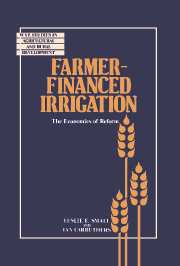Book contents
- Frontmatter
- Contents
- Preface
- 1 Irrigation financing in perspective
- Part I Analysing financing policies: theory and concepts
- Part II Criteria for evaluating irrigation financing policies
- 4 Cost-effective operation and maintenance
- 5 Allocating a scarce resource: water-use efficiency
- 6 Improving investment decisions
- 7 Resource-mobilisation efficiency
- 8 The concern for equity
- Part III Financial autonomy and user fees: key implementation issues
- Notes
- Index
7 - Resource-mobilisation efficiency
Published online by Cambridge University Press: 05 November 2011
- Frontmatter
- Contents
- Preface
- 1 Irrigation financing in perspective
- Part I Analysing financing policies: theory and concepts
- Part II Criteria for evaluating irrigation financing policies
- 4 Cost-effective operation and maintenance
- 5 Allocating a scarce resource: water-use efficiency
- 6 Improving investment decisions
- 7 Resource-mobilisation efficiency
- 8 The concern for equity
- Part III Financial autonomy and user fees: key implementation issues
- Notes
- Index
Summary
Political leaders enjoy the fiscal activity of spending money! This creates the necessity for another, albeit less popular, fiscal activity: generating the funds to make these expenditures possible. Many alternative approaches to obtaining the needed resources exist, each with its own political advantages and disadvantages. Inherent in these fiscal decisions, therefore, are issues of political economy – a matter that we address in Chapter 12. But each alternative would also entail real welfare costs to society. These costs, as we noted in Chapter 3, include both relatively explicit administrative costs and the less obvious but still real economic distortion costs. Resource-mobilisation efficiency relates the resources acquired by the government to the total costs (including both explicit administrative costs and implicit economic distortion costs) of generating them. To the extent that the government seeks the objective of resource-mobilisation efficiency, it will attempt to minimise these costs relative to the amount of resources generated.
One common misconception about resource-mobilisation efficiency should be laid to rest immediately. It is frequently presumed that because government expenditures for the construction and operation of irrigation projects provide direct benefits to water users, resource-mobilisation efficiency implies the desirability of a user charge to capture and return to the government a portion of these benefits. No such generalisations can be made. Although, as we argue elsewhere in this book, there may well be a number of good reasons to link irrigation expenditures to a system of user fees, nothing in economic theory suggests that user fees will be the most efficient method of mobilising the resources to pay for these expenditures.
Information
- Type
- Chapter
- Information
- Farmer-Financed IrrigationThe Economics of Reform, pp. 109 - 117Publisher: Cambridge University PressPrint publication year: 1991
